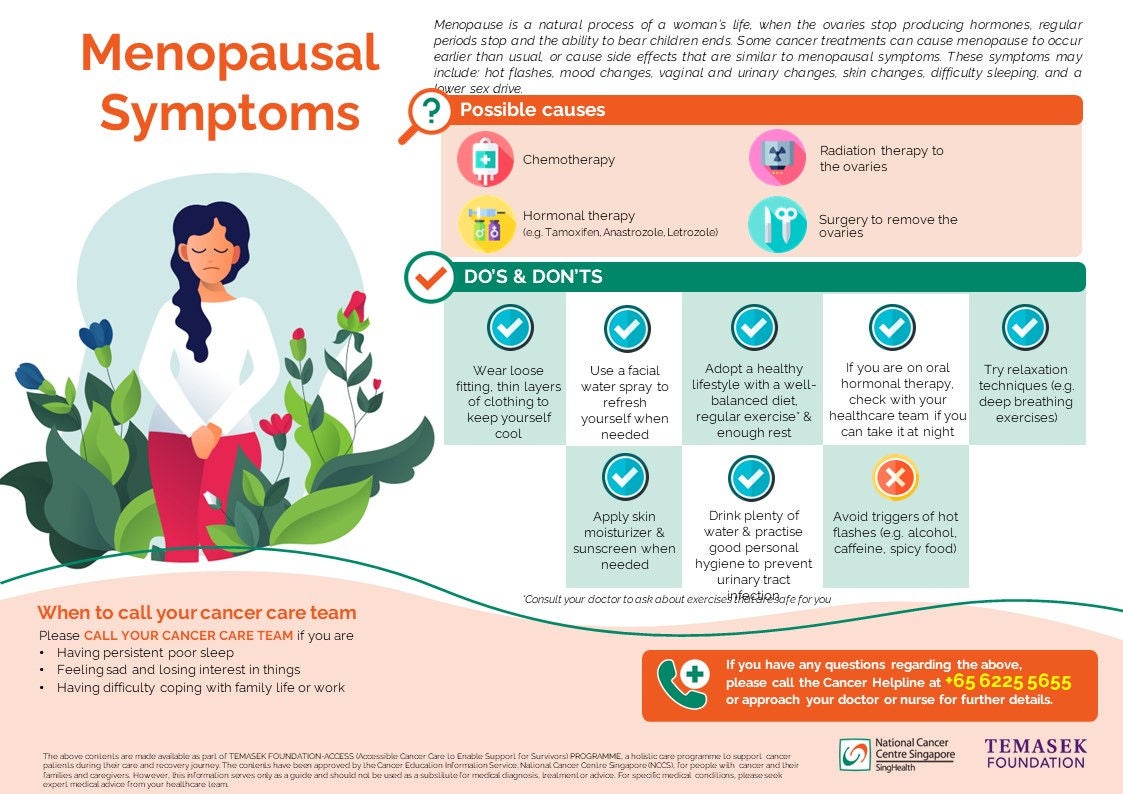Menopausal Symptoms and Cancer
- Allergies
- Appetite Loss
- Bone Problems
- Breathing Problems
- Constipation
- Diarrhoea
- Difficulty Swallowing (Dysphagia)
- Dry Mouth (Xerostomia)
- Difficulty Sleeping (Insomnia)
- Feeling Tired (Fatigue)
- Fevers and Infections
- Hair Loss
- Heart Problems
- Menopausal Symptoms
- Indigestion
- Joint Pains
- Limb Swelling (Lymphedema)
- Muscle Aches
- Nail Changes
- Nausea and Vomiting
- Pain
- Tingling or Numbness in Hands or Feet (Peripheral Neuropathy)
- Skin Changes
- Sore Mouth (Oral Mucositis)
- Taste Changes

Menopause is a natural process of a woman’s life, when the ovaries stop producing hormones, regular periods stop and the ability to bear children ends. Most women become menopausal naturally between the ages of 45 and 55 years. Some cancer treatments can also cause menopause to occur much earlier than usual. This may result in menopausal symptoms that may cause discomfort and affect your daily life.
Causes of Menopause in Cancer
The following cancer treatments can cause early menopause and/or side effects that are similar to menopausal symptoms:
- Chemotherapy drugs
- Hormonal therapy e.g. Tamoxifen, Anastrozole, Letrozole, Exemestane, Leuprorelin, Goserelin
- Radiotherapy to the hip or pelvic areas
- Surgery to remove the ovaries, which causes permanent menopause
What you need to look out for
Mainly caused by hormonal changes within the body, common menopausal symptoms are listed below. Some women may have one or more of these symptoms, and the severity may vary:
- Hot flashes. These may manifest as sudden warmth in your face, neck or chest. Some women may perspire or feel their heart beating faster. Although these usually go away within a few minutes, flashes and sweats occurring at night may disrupt sleep.
- Mood changes. Also called mood swings, these are changes in your emotional state, where you may experience fluctuating emotions like feeling happy one moment and upset the next, sometimes for no reason. The most common emotions experienced are sadness, frustration, irritation and anxiety.
- Vaginal and urinary changes. Low hormone levels can cause tissue thinning, dryness and irritation in the vaginal area, in turn causing discomfort and pain, especially during sexual intercourse or gynaecological examinations. Some women may also experience more infections in the area (e.g. urinary tract infections).
- Skin changes. Lower hormone levels can cause your skin to become thinner and drier. You might also develop acne, due to changes in your hormone levels.
- Difficulty sleeping. It is unclear how the changes in hormone levels can directly affect your sleep, but other menopausal symptoms such as hot flashes, night sweats and mood changes can all interrupt sleep, and the lack of sleep can in turn lead to other problems such as feeling irritable, tired and having poorer memory and concentration.
- Loss of interest in sex. You may also experience a lower sex drive, and this may be caused by not only changes in hormone levels, but also other menopausal symptoms like hot flashes and vaginal dryness, or cancer and its treatments.
Menopause can also have other effects on the body such as thinning of the bones (osteoporosis), infertility and increased risk of heart disease. Talk to your healthcare team to explore ways to manage these issues, so that they do not affect your quality of life.
How it can be treated
Your doctor or nurse may ask you more questions regarding the symptom(s) that you are concerned about, and recommend you practical tips to manage them (see section on “What you can do”). Depending on your needs and concerns, you may also be referred to the sexuality clinic or the psychosocial team, to help you cope better with your menopausal symptoms.
What you can do
The following are some of the lifestyle changes that you may adopt:
Hot flashes
|
|
Mood changes
|
|
Vaginal and urinary changes
|
|
Skin changes
|
|
When to consult your cancer care team
Please inform your doctor or nurse if you feel that any menopausal symptom is affecting your daily life, or if you experience any of the following:
- Persistent poor sleep
- Feeling sad and losing interest in things
- Difficulty coping with family life or work
If you are a patient with NCCS, you may also call +65 6306 1777 or +65 6436 8088 to book an appointment to speak to an NCCS medical social worker.
If you have any questions regarding the above information, please call Cancer Helpline at +65 6225 5655 or approach your doctor or nurse for further details.
Click here to download the PDF version of this article.
如果您要下载本文的中文版本,请点击此处。
Klik di sini untuk memuat turun versi PDF artikel ini.
The above contents are made available as part of TEMASEK FOUNDATION-ACCESS (Accessible Cancer Care to Enable Support for Survivors) PROGRAMME, a holistic care programme to support cancer patients during their care and recovery journey.
The contents have been approved by the Cancer Education Information Service, National Cancer Centre Singapore (NCCS), for people with cancer and their families and caregivers. However, this information serves only as a guide and should not be used as a substitute for medical diagnosis, treatment or advice. For specific medical conditions, please seek expert medical advice from your healthcare team.
Brought to you by:
![]()
![]()
Keep Healthy With
© 2025 SingHealth Group. All Rights Reserved.

















